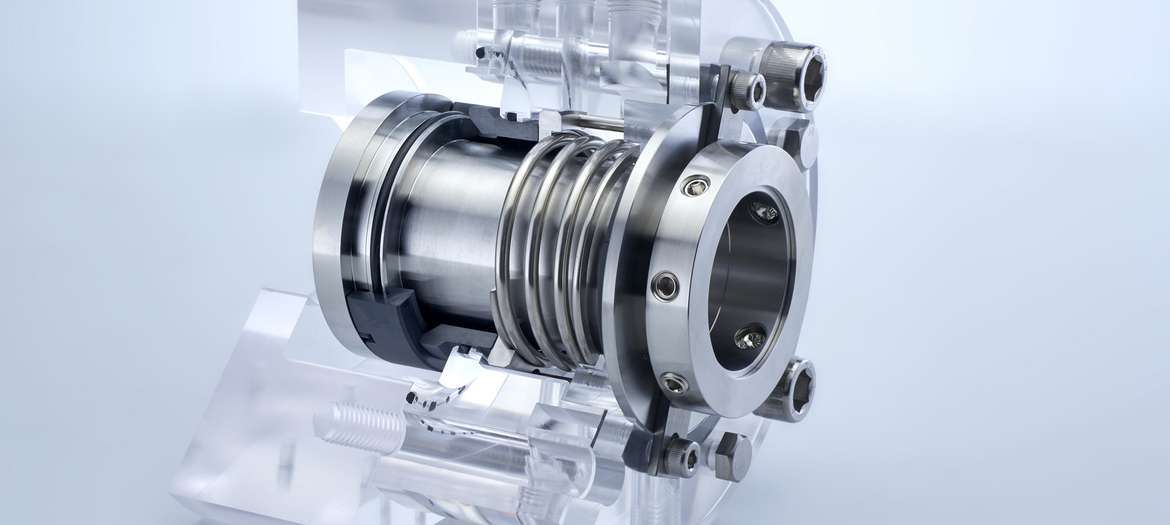Situation
Leaking shaft seal of a sulfur transfer pump in a chemical plant
SulfurAce – sealing solution for crystallizing media

Leaking shaft seal of a sulfur transfer pump in a chemical plant
Crystallizing media, extension of maintenance intervals
EagleBurgmann SulfurAce with integrated QS300 quench seal
Sulfur is an important base material that is used, for example, in refineries and chemical and pharmaceutical industries to produce sulfuric acid, dyes, rubber, synthetic fibers, insecticides, artificial fertilizers and other products. As a hazardous substance, sulfur is a challenging element for the technology and the various processes. It is flammable (dust explosion hazard), among other things, and in its liquid state with the addition of air it will generate a very toxic sulfur dioxide (SO2). The substance also exhibits crystallizing properties, which regularly cause problems during the technical processing.
Sulfur is in a liquid state in a temperature range between +120 °C … +160 °C (+248 °F … 320 °F). While pumping liquid sulfur, continuous minimal leakage in the area of the shaft seal frequently causes problems. This leakage clogs the drainage pipes and causes the steam quench to escape through the throttle bushing in the direction of the bearings where considerable damage can occur as a result. The sulfur leakage crystallizes and strongly contaminates the pump and environment.
In a chemical plant in Japan, a pump is used to transport liquid sulfur. Competitor seals had been originally installed as shaft seals (pusher and metal bellows single seals). But they exhibited an MTBR (Mean Time Between Repair) of only 9 months.
Visible signs of seal failure and its associated leakage were massive accumulations of crystallized sulfur in the vicinity of the pump. The costs for maintenance and cleaning work were accordingly expensive and ultimately posed a considerable risk to the employees and to the environment.
The determined cause for the seal failures was the clogging and blocking of the spring or bellows due to crystallized sulfur. This reduced the spring force or caused it to fail entirely, and the seals opened. The cleaning force of the steam quench was strongly reduced as a result and the temperature required for the function was not attained.
With the new EagleBurgmann SulfurAce mechanical seals specifically designed for use in liquid sulfur and other crystallizing media, problems are a thing of the past. Optimal availability and functionality of the pump, a clean working environment in the system and significantly reduced maintenance costs are attainable for the end user.
The quality of the EagleBurgmann SulfurAce lies in the product-protected single spring and drive pin. In the event of leakage, the large sphere of action of the single spring together with the cleaning effect of the direct steam quench prevents the components and connected lines from clogging. The integrated EagleBurgmann QS300 quench seal effectively prevents quench steam leakage in the direction of the bearings.
The pump was successfully retrofitted to an EagleBurgmann SulfurAce. The seal concept – single spring facing away from the product, integrated EagleBurgmann QS300 quench seal – presents a permanently reliable solution.
As a result of EagleBurgmann’s experience, the steam quench was also optimized; a seal cover with steam direct-flow ensures additional safety.
(For sulfur and carbamide)

Between June 2017 and March 2019 the Hengli Group constructed an integrated refining and chemical complex in the Chinese harbor town Dalian where 20 million tons of crude oil are processed every year. EagleBurgmann advised the company Hengli concerning the selection of mechanical seals and supply systems for the whole plant and supplied more than 95 % of the components in use.

In Great Britain, a shortage in natural gas supply has severe consequences: Since the country switched from coal-fired to gas-fired power stations, a gas supply shortage makes households and industrial consumers not only vulnerable to failing heating and gas stoves, but also to power outages. Companies along the value and transportation chain of natural gas are therefore especially dependent on reliable equipment.

Things get hot in rotary kilns, very hot in fact. In the production of cement, for example, the thermometer measures more than 1,000 degrees Celsius. Sealing systems from EagleBurgmann, a company of the Freudenberg Group and EKK, make sustainable contributions to environmental protection, energy efficiency and process reliability under these "fiery" high-temperature conditions.

Our modern civilization is quite literally built upon cement. Today, building materials made from cement are used in buildings, roads, bridges, dams etc. Cement production is a heat-intensive process and causes thermal expansion in duct systems. To compensate this, Indian cement producer Ramco Cement needed fabric expansion joints with a diameter of several meters for two of their plants. On the basis of a close collaboration, EagleBurgmann was able to design components that increase the efficiency of the plant in the long run.

Frequent starts and stops are a severe test for gas-lubricated compressor seals. Installed in an Argentinean combined cycle power plant is an EagleBurgmann supply system that provides a continuous gas flow rate for the seals and adapts it to changing conditions. Since then, the operational reliability of the compressors has increased significantly.

Seals are a risk factor in the production of liquid crystals. If there is even the slightest contamination of the liquid crystals, this will later affect the image quality of the display. Read on to see which sealing solution Merck KGaA uses in paddle dryers for the production of liquid crystals.